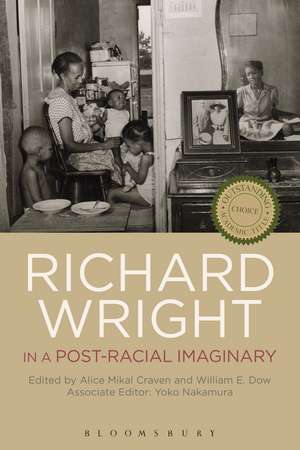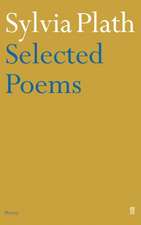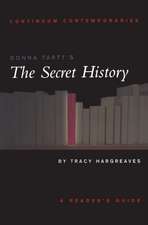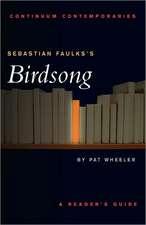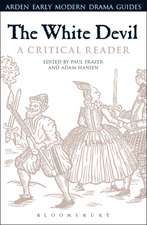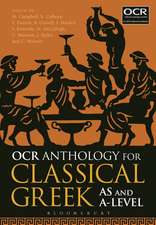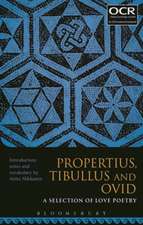Richard Wright in a Post-Racial Imaginary
Editat de Dr. William E. Dow, Professor Alice Mikal Craven, Dr. Yoko Nakamuraen Limba Engleză Paperback – 24 feb 2016
| Toate formatele și edițiile | Preț | Express |
|---|---|---|
| Paperback (1) | 186.63 lei 3-5 săpt. | |
| Bloomsbury Publishing – 24 feb 2016 | 186.63 lei 3-5 săpt. | |
| Hardback (1) | 833.06 lei 6-8 săpt. | |
| Bloomsbury Publishing – 24 sep 2014 | 833.06 lei 6-8 săpt. |
Preț: 186.63 lei
Preț vechi: 216.04 lei
-14% Nou
Puncte Express: 280
Preț estimativ în valută:
35.71€ • 37.36$ • 29.67£
35.71€ • 37.36$ • 29.67£
Carte disponibilă
Livrare economică 12-26 martie
Preluare comenzi: 021 569.72.76
Specificații
ISBN-13: 9781501312694
ISBN-10: 1501312693
Pagini: 296
Dimensiuni: 152 x 229 x 18 mm
Greutate: 0.42 kg
Editura: Bloomsbury Publishing
Colecția Bloomsbury Academic
Locul publicării:New York, United States
ISBN-10: 1501312693
Pagini: 296
Dimensiuni: 152 x 229 x 18 mm
Greutate: 0.42 kg
Editura: Bloomsbury Publishing
Colecția Bloomsbury Academic
Locul publicării:New York, United States
Caracteristici
Reassesses Wright's contributions to and influences on world literary history from 21st-century critical positions
Notă biografică
William Dow is Professor of American Literature at Université Paris-Est (UPEM), France, and Adjunct Professor of English at the American University of Paris. His previous publications include, as co-editor, Richard Wright: New Readings in the 21st Century (2011). He is an Associate Editor of Literary Journalism Studies.Alice Craven is Associate Professor in the Departments of English and Comparative Literature and Film Studies at American University of Paris, France, and Directeur de theses, Master program, in the Department of English at Institut Catholique de Paris, France. She is co-editor of Richard Wright: New Readings in the 21st Century (2011).Yoko Nakamura is a graduate student at the University of Iowa, USA.
Cuprins
Foreword: Amritjit SinghAcknowledgementsIntroduction: Alice Mikal Craven, William E. DowPart 1: Wright as Global Intellectual and Racial ReformerJames Smethurst, "After Modernism: Richard Wright Interprets the Black Belt."Cynthia Tolentino, "Sociological Interests, Racial Reform: Richard Wright's Intellectual of Color."Mark Mvé Bekale, "The Negro Intellectual and the Tragic Sense of Hybridity: A Study in Postcolonial Existentialism."Anthony Dawahare, "Richard Wright's Native Son and the Dialectics of Black Experience."Part 2: The Pursuit of Sovereignty in Wright's Political and Artistic OdysseyLaurence Cossu-Beaumont, "Richard Wright and His Editors: A Work under the Influence? From the Signifyin(g) Rebel to the Exiled Intellectual."Shoshana Milgram Knapp, "Recontextualizing Richard Wright's The Outsider: Hugo, Dostoevsky, Max Eastman, and Ayn Rand."Barbara Foley, "'A Dramatic Picture . . . of Woman from Feudalism to Fascism': Richard Wright's Black Hope."Part 3: Wright's Other Destinies: Gothicism and the Neo-BaroqueCharles Scruggs, "'Forged in Injustice': The Gothic Motif in the Fiction of Ernest Hemingway and Richard Wright."William E. Dow, "Pulp Gothicism in Richard Wright's The Outsider."Michel Feith, "Working the Underground Seam: Richard Wright's 'The Man Who Lived Underground' in the Light of Percival Everett's Zulus."Part 4: Richard Wright's Sweet Airs: Experiments with Performance GenresBruce Allen Dick, "Forgotten Chapter: Richard Wright, Playwrights, and the Modern Theater."Steven C. Tracy, "A Wright to Sing the Blues: King Joe's Punch."Part 5: Transnational Shifts: Silence and SentimentAlice Mikal Craven, "Richard Wright's 'Island' of Silence in The Long Dream."Sudhi Rajiv, "Expanding Metaphors of Marginalization: Richard Wright, Sharankumar Limbale, and a Post-Caste Imaginary."Sandy Alexandre, "Culmination in Miniature: Late Style and the Essence of Richard Wright's Haiku."ContributorsIndex
Recenzii
The second of a two-volume set, this collection grew out of a conference marking the centenary of Richard Wright's birth.James Smethurst establishes the tone of the collection with the observation that Wright drew on a wide spectrum of genres--Gothic literature, proletarian and naturalist literature--and on such movements as existentialism and Marxism in order to render more palpable the lived realities of blacks in a segregated urban environment during the 1930s.Summing Up: Essential. Upper-division undergraduates through faculty.
One of the primary objectives of this volume is to stress the diversity of Richard Wright's influences, and in this regard it can be considered a success, the multitude of essay topics reflecting the variety of Wright's inspirations. . Its engagement with postmodern concerns of transnationalism, performativity and intertextuality make it an informed contribution to contemporary studies of Richard Wright and American Literature, and therefore, to make my own prediction, make it a lasting work of Wright criticism.
Richard Wright in a Post-Racial Imaginary makes critically important contributions to a twenty-first century study of Wright by providing a series of fresh perspectives on his published and unpublished work. Stressing Wright's 'cultural hybridity,' these penetrating essays lay special stress on his underappreciated later works which are centered in a 'global humanist vision.' Wright is thus liberated from the all-too-common view of him as a proletarian writer of the 1930s and affirms his status as a 'major world-class writer' who speaks powerfully to us today.
A long awaited reassessment of Richard Wright's works and thought, the essays in this collection repudiate a narrow appreciation of Wright's ouvre and open up radically new critical ventures. They celebrate Wright as a global intellectual, a transnational humanist, as they review his relation to existentialism and qualify his links to modernism. They analyze his published works-the canonical as well as the marginal-by looking at the unpublished and the censored. They recast his gender politics and locate him within a resolutely diasporic framework that embraces his later productions. Such a bold critical revision makes us read Wright with Ernest Hemingway, Victor Hugo, Cheikh Hamidou Kane, Percival Everett and Dalit writer Limbale, but also from the perspective of popular culture, the blues, haiku poetry and drama. In sum, they affirm the uncontested relevance of Wright's contribution as a writer and a thinker beyond race and nationality.
Richard Wright in a Post-Racial Imaginary represents an unyielding collection of essays that challenges paradigmatic readings of Richard Wright's genius. This twenty-first century text asks that we re-examine Wright's most well-known texts, proposing that some of his lesser-known and unpublished texts illuminate Wright as a more complex intellectual than previous studies explore. By placing Richard Wright in the context of twenty-first century post-racial ideology and theory, Richard Wright in a Post-Racial Imaginary raises many highly provocative questions that should certainly ignite a new dialogue around his intellectual transformation from Mississippi, Memphis, Chicago, and New York to a global arena in Mexico, Europe, Africa, and Asia.
One of the primary objectives of this volume is to stress the diversity of Richard Wright's influences, and in this regard it can be considered a success, the multitude of essay topics reflecting the variety of Wright's inspirations. . Its engagement with postmodern concerns of transnationalism, performativity and intertextuality make it an informed contribution to contemporary studies of Richard Wright and American Literature, and therefore, to make my own prediction, make it a lasting work of Wright criticism.
Richard Wright in a Post-Racial Imaginary makes critically important contributions to a twenty-first century study of Wright by providing a series of fresh perspectives on his published and unpublished work. Stressing Wright's 'cultural hybridity,' these penetrating essays lay special stress on his underappreciated later works which are centered in a 'global humanist vision.' Wright is thus liberated from the all-too-common view of him as a proletarian writer of the 1930s and affirms his status as a 'major world-class writer' who speaks powerfully to us today.
A long awaited reassessment of Richard Wright's works and thought, the essays in this collection repudiate a narrow appreciation of Wright's ouvre and open up radically new critical ventures. They celebrate Wright as a global intellectual, a transnational humanist, as they review his relation to existentialism and qualify his links to modernism. They analyze his published works-the canonical as well as the marginal-by looking at the unpublished and the censored. They recast his gender politics and locate him within a resolutely diasporic framework that embraces his later productions. Such a bold critical revision makes us read Wright with Ernest Hemingway, Victor Hugo, Cheikh Hamidou Kane, Percival Everett and Dalit writer Limbale, but also from the perspective of popular culture, the blues, haiku poetry and drama. In sum, they affirm the uncontested relevance of Wright's contribution as a writer and a thinker beyond race and nationality.
Richard Wright in a Post-Racial Imaginary represents an unyielding collection of essays that challenges paradigmatic readings of Richard Wright's genius. This twenty-first century text asks that we re-examine Wright's most well-known texts, proposing that some of his lesser-known and unpublished texts illuminate Wright as a more complex intellectual than previous studies explore. By placing Richard Wright in the context of twenty-first century post-racial ideology and theory, Richard Wright in a Post-Racial Imaginary raises many highly provocative questions that should certainly ignite a new dialogue around his intellectual transformation from Mississippi, Memphis, Chicago, and New York to a global arena in Mexico, Europe, Africa, and Asia.
